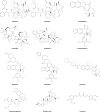Tumor-targeting delivery of herb-based drugs with cell-penetrating/tumor-targeting peptide-modified nanocarriers
- PMID: 29563797
- PMCID: PMC5849936
- DOI: 10.2147/IJN.S156616
Tumor-targeting delivery of herb-based drugs with cell-penetrating/tumor-targeting peptide-modified nanocarriers
Abstract
Cancer has become one of the leading causes of mortality globally. The major challenges of conventional cancer therapy are the failure of most chemotherapeutic agents to accumulate selectively in tumor cells and their severe systemic side effects. In the past three decades, a number of drug delivery approaches have been discovered to overwhelm the obstacles. Among these, nanocarriers have gained much attention for their excellent and efficient drug delivery systems to improve specific tissue/organ/cell targeting. In order to enhance targeting efficiency further and reduce limitations of nanocarriers, nanoparticle surfaces are functionalized with different ligands. Several kinds of ligand-modified nanomedicines have been reported. Cell-penetrating peptides (CPPs) are promising ligands, attracting the attention of researchers due to their efficiency to transport bioactive molecules intracellularly. However, their lack of specificity and in vivo degradation led to the development of newer types of CPP. Currently, activable CPP and tumor-targeting peptide (TTP)-modified nanocarriers have shown dramatically superior cellular specific uptake, cytotoxicity, and tumor growth inhibition. In this review, we discuss recent advances in tumor-targeting strategies using CPPs and their limitations in tumor delivery systems. Special emphasis is given to activable CPPs and TTPs. Finally, we address the application of CPPs and/or TTPs in the delivery of plant-derived chemotherapeutic agents.
Keywords: cancer; cell-penetrating peptide; herb-based drug; nanocarriers; targeting drug delivery; tumor targeting.
Conflict of interest statement
Disclosure The authors report no conflicts of interest in this work.
Figures



Similar articles
-
Recent developments in anticancer drug delivery using cell penetrating and tumor targeting peptides.J Control Release. 2017 Mar 28;250:62-76. doi: 10.1016/j.jconrel.2017.02.006. Epub 2017 Feb 4. J Control Release. 2017. PMID: 28167286 Review.
-
Cell penetrating peptides: efficient vectors for delivery of nanoparticles, nanocarriers, therapeutic and diagnostic molecules.Peptides. 2014 Jul;57:78-94. doi: 10.1016/j.peptides.2014.04.015. Epub 2014 Apr 30. Peptides. 2014. PMID: 24795041 Review.
-
PEGylated liposomes with NGR ligand and heat-activable cell-penetrating peptide-doxorubicin conjugate for tumor-specific therapy.Biomaterials. 2014 May;35(14):4368-81. doi: 10.1016/j.biomaterials.2014.01.076. Epub 2014 Feb 22. Biomaterials. 2014. PMID: 24565519
-
Dual cell-penetrating peptide-conjugated polymeric nanocarriers for miRNA-205-5p delivery in gene therapy of cutaneous squamous cell carcinoma.Acta Biomater. 2025 Apr;196:332-349. doi: 10.1016/j.actbio.2025.02.056. Epub 2025 Feb 25. Acta Biomater. 2025. PMID: 40015353
-
Cell-penetrating peptides with nanoparticles hybrid delivery vectors and their uptake pathways.Mitochondrion. 2024 Sep;78:101906. doi: 10.1016/j.mito.2024.101906. Epub 2024 May 24. Mitochondrion. 2024. PMID: 38797356 Review.
Cited by
-
Advances and prospects of precision nanomedicine in personalized tumor theranostics.Front Cell Dev Biol. 2024 Dec 5;12:1514399. doi: 10.3389/fcell.2024.1514399. eCollection 2024. Front Cell Dev Biol. 2024. PMID: 39712574 Free PMC article. Review.
-
Targeted Hybrid Nanocarriers as Co-Delivery Systems for Enhanced Cancer Therapy.Adv Pharm Bull. 2024 Oct;14(3):558-573. doi: 10.34172/apb.2024.046. Epub 2024 May 15. Adv Pharm Bull. 2024. PMID: 39494247 Free PMC article. Review.
-
Tumor Microenvironment-Responsive Peptide-Based Supramolecular Drug Delivery System.Front Chem. 2020 Jul 22;8:549. doi: 10.3389/fchem.2020.00549. eCollection 2020. Front Chem. 2020. PMID: 32775317 Free PMC article. Review.
-
Cell penetrating peptides in preclinical and clinical cancer diagnosis and therapy.Oncotarget. 2018 Dec 14;9(98):37252-37267. doi: 10.18632/oncotarget.26442. eCollection 2018 Dec 14. Oncotarget. 2018. PMID: 30647857 Free PMC article. Review.
-
Encapsulation of chloroquine and doxorubicin by MPEG-PLA to enhance anticancer effects by lysosomes inhibition in ovarian cancer.Int J Nanomedicine. 2018 Dec 3;13:8231-8245. doi: 10.2147/IJN.S174300. eCollection 2018. Int J Nanomedicine. 2018. PMID: 30584297 Free PMC article.
References
-
- World Health Organization Cancer 2018. [Accessed February 13, 2018]. Available from: http://www.who.int/mediacentre/factsheets/fs297/en.
-
- Pérez-Herrero E, Fernández-Medarde A. Advanced targeted therapies in cancer: drug nanocarriers, the future of chemotherapy. Eur J Pharm Biopharm. 2015;93:52–79. - PubMed
-
- Ghaz-Jahanian MA, Abbaspour-Aghdam F, Anarjan N, Berenjian A, Jafarizadeh-Malmiri H. Application of chitosan-based nanocarriers in tumor-targeted drug delivery. Mol Biotechnol. 2015;57:201–218. - PubMed
-
- Tannock IF, Lee CM, Tunggal JK, Cowan DS, Egorin MJ. Limited penetration of anticancer drugs through tumor tissue: a potential cause of resistance of solid tumors to chemotherapy. Clin Cancer Res. 2002;8:878–884. - PubMed
-
- Sutradhar KB, Amin ML. Nanotechnology in cancer drug delivery and selective targeting. ISRN Nanotechnology. 2014;2014:939378.
Publication types
MeSH terms
Substances
LinkOut - more resources
Full Text Sources
Other Literature Sources
Miscellaneous

